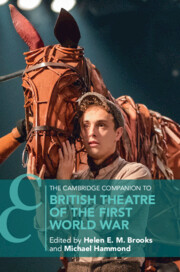Book contents
- The Cambridge Companion to British Theatre of the First World War
- Cambridge Companions to Theatre and Performance
- The Cambridge Companion to British Theatre of the First World War
- Copyright page
- Contents
- Figures
- Notes on Contributors
- Chronology of Events and Productions
- Introduction
- Part I Mobilising for War
- Part II Theatre during the War
- Chapter 3 Challenging Times
- Chapter 4 Everyone’s a Playgoer Now!
- Chapter 5 Theatre in the War Zone
- Chapter 6 The Classics at War
- Chapter 7 War on the Popular Stage
- Chapter 8 Cinema and Theatre in the Great War
- Chapter 9 ‘American Invasions’
- Chapter 10 European Theatre on the British Stage 1914–1918
- Chapter 11 Resistance and Objection
- Part III The Memory of War
- Further Reading
- Index
Chapter 11 - Resistance and Objection
from Part II - Theatre during the War
Published online by Cambridge University Press: 19 October 2023
- The Cambridge Companion to British Theatre of the First World War
- Cambridge Companions to Theatre and Performance
- The Cambridge Companion to British Theatre of the First World War
- Copyright page
- Contents
- Figures
- Notes on Contributors
- Chronology of Events and Productions
- Introduction
- Part I Mobilising for War
- Part II Theatre during the War
- Chapter 3 Challenging Times
- Chapter 4 Everyone’s a Playgoer Now!
- Chapter 5 Theatre in the War Zone
- Chapter 6 The Classics at War
- Chapter 7 War on the Popular Stage
- Chapter 8 Cinema and Theatre in the Great War
- Chapter 9 ‘American Invasions’
- Chapter 10 European Theatre on the British Stage 1914–1918
- Chapter 11 Resistance and Objection
- Part III The Memory of War
- Further Reading
- Index
Summary
This chapter focuses on issues of objection and dissent. As well as examining the ways in which the theatre challenged or questioned the war - through works such as Drinkwater’s X=0 (1917) and Malleson’s banned Black ‘Ell (1917) - it considers the theatre’s representation of objectors to the war - through pieces such as Jones’ The Pacifists (1917) and Collins’ revue sketch The Consciensciousless Objector (1916). It contextualises the production of these works in relation to changes in wider attitudes towards the war, as well as considering how playwrights with pacifist leanings were constrained both by the censor and by cultural nationalism. It discusses the contribution of George Bernard Shaw to debates over the war and, as the final chapter in this part of the book, it also links to part III and the discussion of changing attitudes towards the war in the 1920s and 1930s.
- Type
- Chapter
- Information
- Publisher: Cambridge University PressPrint publication year: 2023

